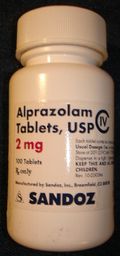|
Find information on thousands of medical conditions and prescription drugs.
|
|
|
Alprazolam
Alprazolam is a short-acting benzodiazepine used to treat anxiety disorders. It is generally sold in generic form (i.e., alprazolam) in the United States (to cut down on costs for insurance companies) and also under many other brand names, depending on the country: more...
 Home Home
 Diseases Diseases
 Medicines Medicines
 A A
 B B
 C C
 D D
 E E
 F F
 G G
 H H
 I I
 J J
 K K
 L L
 M M
 N N
 O O
 P P
 Q Q
 R R
 S S
 T T
 U U
 V V
 W W
 X X
 Alprazolam Alprazolam
 Xeloda Xeloda
 Xeloda Xeloda
 Xeneisol Xeneisol
 Xenical Xenical
 Xylazine Xylazine
 Xylocaine Xylocaine
 Xylometazoline Xylometazoline
 Xyrem Xyrem
 Y Y
 Z Z
- Xanax® - United States, Australia, United Kingdom
- Xanax XR® - (an extended release formulation) United States
- Apotex® - Canada
- Xanor® - Finland, Philippines, South Africa, Sweden
- Kalma® - Australia, New Zealand
- Ralozam® - Australia, New Zealand
- Zamhexal® - Australia
- Alplax® - Argentina
- Alviz® - Indonesia
- Alzolam® - India, Malaysia
- Alprax® - India
- Tranax® - India
- Restyl® - Bahrain, Cyprus, Egypt, Iran, Iraq, Jordan, Kuwait, Lebanon, Libya, Oman, Qatar, Republic of Yemen, Saudi Arabia, Syria, United Arab Emirates
- Tranquinal® - Ecuador, Peru
- Trankimazin® - Spain
- Tafil® - Costa Rica, Denmark, El Salvador, Germany, Guatemala, Honduras, Mexico, Nicaragua, Panama, Venezuela
- Tafil AP® - (an extended release formulation) Mexico
- Constan® - Japan
- Solanax® - Japan
- Zolarem® - Bahrain, Benin, Burkina-Faso, Cyprus, Egypt, Ethiopia, Gambia, Ghana, Guinea, Iran, Iraq, Israel, Ivory Coast, Jordan, Kenya, Kuwait, Lebanon, Liberia, Libya, Malawi, Mali, Mauritania, Mauritius, Morocco, Niger, Nigeria, Oman, Qatar, Republic of Yemen, Saudi Arabia, Senegal, Seychelles, Sierra-Leone, South Africa, Sudan, Syria, Tanzania, Tunia, Uganda, United Arab Emirates, Zambia, Zimbabwe
- Zoldac® - Benin, Burkina-Faso, Ethiopia, Gambia, Ghana, Guinea, India, Ivory Coast, Kenya, Liberia, Malawi, Mali, Mauritania, Mauritius, Morocco, Niger, Nigeria, Senegal, Seychelles, Sierra-Leone, South Africa, Sudan, Tanzania, Tunia, Uganda, Zambia, Zimbabwe
Alprazolam has a calming effect, with the most common side effects being drowsiness, clumsiness, and to a lesser extent, fatigue, and headache. It can also have more adverse effects, such as blurred vision, slurred speech or dysarthria, and changes in personality. It may be habit forming and users often develop a tolerance to its initial effects, although its anxiolytic efficacy remains intact. Physical and/or psychological dependence may develop after several weeks of alprazolam treatment. There is now a general consensus among many psychiatrists that alprazolam (a so-called 'high-potency' benzodiazepine) poses a particularly high risk for abuse and dependence. Withdrawal after long-term use should be done slowly over a period of weeks to avoid serious withdrawal symptoms such as agitation, rebound anxiety, muscle cramps and possible seizures. Some patients may benefit from a more gradual dosage reduction and/or discontinuation and substitution with diazepam.
Read more at Wikipedia.org
• [List your site here Free!]
|
|
|
|
Alprazolam in emergency treatment of schizophrenia - Tips from Other Journals
From American Family Physician,
10/1/92
Neuroleptics are the mainstay of drug intervention in the emergency management of psychosis. However, other drugs, especially the benzodiazepines, have been investigated as adjunct therapy to improve the efficacy and safety of the neuroleptics. Many reports have focused on the use of benzodiazepines in the treatment of acute mania, but the use of benzodiazepines in the nonemergency treatment of schizophrenia has revealed little evidence of overall benefit. Barbee and colleagues conducted a prospective double-blind study to evaluate the use of alprazolam as a neuroleptic adjunct in the emergency treatment of schizophrenia.
A total of 28 acutely psychotic patients with a known diagnosis of schizophrenia were recruited from an emergency psychiatric service. Patients were between 18 and 60 years of age and had entered the study voluntarily. Each was randomly assigned to receive either 5 mg of haloperidol with placebo or 5 mg of haloperidol with 1 mg of alprazolam. Patients were excluded from the study if they were using other psychotropic drugs, including alcohol, if they were pregnant, if they had a coexisting axis I diagnosis or if they had a significant medical disorder.
The patients were evaluated at baseline with a questionnaire to identify psychotic symptoms, specifically, suspiciousness, hallucinatory behavior, uncooperativeness, conceptual disorganization, unusual thought content and excitement. The questionnaires were administered again every two hours for the first eight hours and at 24, 48 and 72 hours. Patients were given repeat doses of medication if scores indicated unstable psychopathology. Side effects were recorded.
Patients receiving haloperidol and alprazolam required fewer doses of medication on the first day than the patients receiving only haloperidol. The two treatments had similar overall efficacy, and the average number of side effects was the same. Dystonic reactions occurred 16 times in the haloperidol group and seven times in the combined therapy group, a difference that was not statistically significant.
The authors conclude that the addition of alprazolam to haloperidol significantly decreases the amount of medication needed to reduce psychotic symptoms in schizophrenic patients. No overall reduction in the core psychotic symptoms was achieved with the addition of alprazolam in this trial. However, alprazolam was effective in the initial hours of treatment for symptoms of excitement and uncooperativeness. (American Journal of Psychiatry, April 1992, vol. 149, p. 506.)
COPYRIGHT 1992 American Academy of Family Physicians
COPYRIGHT 2004 Gale Group
Return to Alprazolam
|
|




